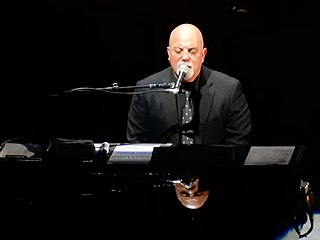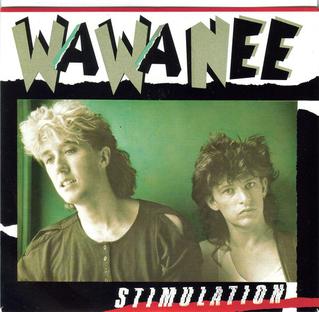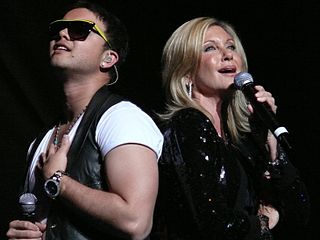Wa Wa Nee was a 1980s Australian funk band.

The discography of American rhythm and blues singer Diana Ross, the former lead singer of the Supremes, consists of 26 studio albums and 116 singles. Throughout her career, Ross has sold over 100 million records worldwide. Billboard ranked her as the 47th Greatest Artist of all time and the 11th Greatest Hot 100 Female Artist of all time. In 1993, Guinness World Records crowned Ross as the "most successful female artist in music history". Her 11th studio album "Diana" remains the best-selling album of her career, selling more than 10 million copies and album-equivalent units around the world.
The discography of the American rock band Heart consists of 15 studio albums, nine live albums, nine compilation albums, 64 singles and 35 music videos. The group, led by Ann and Nancy Wilson, have sold about 35 million records worldwide.

American-born Swiss singer Tina Turner released nine studio albums, three live albums, two soundtracks, and six compilation albums. Widely referred to as the "Queen of Rock 'n' Roll", Turner had reportedly sold around 100 to 150 million records worldwide, making her one of the best-selling female artists in music history. According to Recording Industry Association of America, Turner has certified sales of 10 million albums in the US, alone.

American singer-songwriter Billy Joel has released 13 studio albums, seven live albums, 18 compilation albums, 10 video albums, 82 singles, three promotional singles, and 45 music videos. Throughout his career, he has sold more than 150 million records worldwide, making him one of the best-selling music artists in history. According to Recording Industry Association of America, Joel has sold 85 million certified albums in the United States, making him the 4th best-selling solo artist of all time. Billboard ranked him as the 9th Greatest male soloist of all time.

The discography of Dead or Alive, a British dance-pop group, consists of six studio albums, seven compilation albums, twenty-eight singles, and two video albums. Formed by frontman Pete Burns in 1980 in Liverpool, the band were first signed to the independent Rough Trade label in 1982, though moved to Epic Records the following year. Their debut album, Sophisticated Boom Boom, was released in 1984, producing a series of minor hits in the UK, most notably their version of "That's the Way " which gave them their first UK Top 40 hit.

"Love Is the Seventh Wave" is a hit single from Sting's 1985 solo debut album The Dream of the Blue Turtles. It was released as the album's second single in the UK, and the third single in the US.

"Words Get in the Way" is a song written by Gloria Estefan and released as the third single from her band, Miami Sound Machine, on their second English language album, and ninth overall, Primitive Love. The song is a ballad and became the highest-charting song off the album.

For over 40 years the discography of The Pretenders, a London, England-based rock band, reflects worldwide charting of 12 studio albums, four compilation albums, one extended play (EP), four live albums, six video albums and 55 singles.

This is the discography of the Northern Irish blues, heavy metal and hard rock guitarist and singer-songwriter Gary Moore.

"Don Quixote" is a song by English singer-songwriter Nik Kershaw from his 1984 studio album The Riddle. Released in August 1985 as the final single from that album, it reached No. 10 on the UK Singles Chart in September 1985, and became Kershaw's seventh consecutive UK top 20 hit single.

"I Can't Wait" is a song by American singer and songwriter Stevie Nicks from her third solo studio album Rock a Little (1985). Written by Nicks, Rick Nowels, and Eric Pressly, the song was released as the album's lead single in Australia, the United Kingdom and Ireland, and as the second single in the United States and Germany.

"Stimulation" is the debut single from Australian pop group Wa Wa Nee. The song was released in April 1986 as the lead single from their self-titled debut studio album. The song peaked at number 2 on the Australian singles chart.

Bear Witness is the first and only studio album by Australian pop rock band I'm Talking. The line-up was Zan Abeyratne and Kate Ceberano on co-lead vocals, Stephen Charlesworth on keyboards, Ian Cox on saxophone, Robert Goodge on lead guitar, Barbara Hogarth on bass guitar and Cameron Newman on drums. It was released in August 1986 on Regular Records and reached No. 14 on the Kent Music Report albums chart. All eight tracks were co-written by Cox (lyrics) and Goodge (music). The album yielded three singles, "Do You Wanna Be?" (May), "Holy Word" (July) and "How Can It Be?" (October).

"The Things We Do for Love" is a song by British band 10cc, released as a single in 1976. It later featured on the album Deceptive Bends released in 1977 and was the group's first release after the departure of band members Kevin Godley and Lol Creme.

"Sugar Free" is a song from Australian pop group Wa Wa Nee. The song was released in December 1986 as the third single from their self-titled debut studio album. The song peaked at number 10 on the Australian singles chart, and number 35 in the US on the Billboard Hot 100.

The singles discography of British-Australian recording artist Olivia Newton-John consists of 70 singles, three as a featured artist and 25 promotional recordings. She was a four-time Grammy award winner who amassed five number-one and ten other Top Ten Billboard Hot 100 singles, seven Top Ten Billboard Hot Country singles, and two number-one Billboard 200 solo albums. Ten of her singles topped Billboard's adult contemporary music singles chart. Eleven of her singles have been certified gold by the RIAA. She sold an estimated 100 million records worldwide, making her one of the world's best-selling artists of all time.

"Lean on You" is a song by British singer Cliff Richard, released as the third single from his 1989 album Stronger. It was written and produced by Alan Tarney. The song peaked at No. 17 on the UK Singles Chart.

"Do You Wanna Be?" is a song by Australian band I'm Talking. It was released in May 1986 as the lead single from the band's debut studio album, Bear Witness. The song peaked at number 8 on the Australian Kent Music Report, becoming the band's highest charting single and second top ten single. An instrumental version of the song was featured in a flat party scene in the 1988 film For Queen and Country.

















